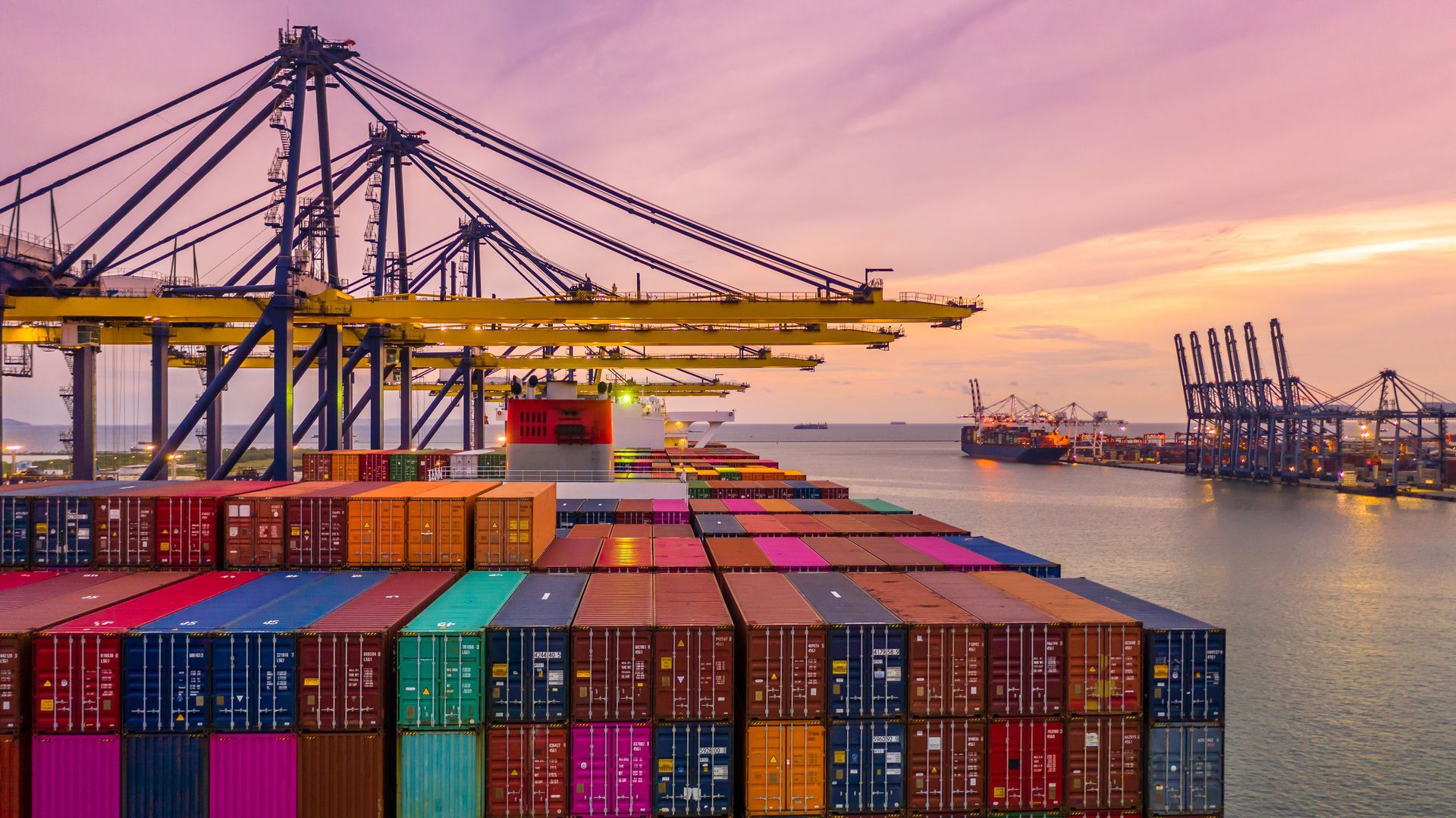Supplies Made Simple™: Talk to our Sales Team today!
External and Global Influences on Supply Chain Operations
External and Global Influences on Supply Chain Operations
The world of supply chain operations is a complex and interconnected web of processes that are influenced by many external factors. In today's globalized economy, these
operations are significantly shaped by external and global influences and must adapt to changing environments. One of the most crucial factors impacting supply chain operations is global trade policies and regulations.
Global Trade Policies and Regulations

Global trade policies, tariffs, and import/export regulations are crucial factors that have a significant impact on supply chain operations worldwide. When countries implement new trade agreements, impose tariffs, or introduce import/export restrictions, supply chains must promptly adapt and reorganize to navigate these changing landscapes. Here are some key impact areas to consider:
Tariffs: Global trade policies impact supply chain operations through tariffs. When governments increase tariffs, it raises the costs of importing goods, prompting companies to reconsider their procurement decisions. Fluctuations in tariffs can disrupt established supply chain dynamics, leading companies to explore alternative supply options.
Export Restrictions: During crises like the COVID-19 pandemic, countries may implement export restrictions to protect essential goods and resources. These restrictions can create bottlenecks in the supply chain, limiting the availability of crucial products and causing widespread disruption. Supply chain managers must respond quickly to maintain operations.
Free Trade Agreements: Free trade agreements, such as the USMCA or treaties within the European Union, simplify cross-border trade by reducing trade barriers and bureaucratic hurdles. They streamline supply chain processes and promote smoother international transactions. Companies that leverage free trade agreements can benefit from reduced friction in their supply chain operations, enabling them to optimize efficiency and drive growth.
Economic Factors Affecting Supply Chains
Economic factors such as inflation, currency fluctuations, and economic downturns have a direct impact on supply chain costs and availability. Supply chain professionals must constantly monitor these trends to adapt their procurement and sourcing strategies in response to changing economic conditions. Here are a few other factors that could be affecting your supply chain:
Rising Costs: The continuous increase in transportation and labor costs poses a significant challenge for supply chain budgets. Companies must find innovative ways to mitigate these costs and optimize their operations to remain competitive in the market.
Commodity Price Volatility: Fluctuations in the cost of raw materials can significantly impact procurement decisions and long-term planning for supply chain operations. Supply chain managers must closely monitor commodity prices and develop strategies to manage volatility effectively.
Currency Exchange Rates: Cross-border transactions are subject to shifts in currency exchange rates, which can impact the cost and viability of international sourcing. Companies engaging in global trade must devise risk management strategies to navigate currency fluctuations and minimize their impact on supply chain operations.
Geopolitical Tensions and Their Effects on Supply Chains

Geopolitical tensions have the potential to cause major disruptions in global supply chain resilience, compelling companies to address unforeseen challenges and adjust their sourcing, logistics management, and distribution strategies. Whether due to trade conflicts, sanctions, or border restrictions, political instability can significantly impact supply chain operations.
Supply Chain Disruption: Political instability can lead to sudden disruptions in the supply chain, such as difficulties in sourcing materials and delays in shipping. Companies need to be prepared to quickly respond to these disruptions to minimize the impact on their operations and customer satisfaction.
Shifting Trade Routes: Sanctions and embargoes can force companies to change their trade partnerships and reroute shipments along different pathways. These changes in trade routes often come with logistical complexities and increased costs, highlighting the importance of adaptability and resilience in the face of geopolitical uncertainties.
Technological Advancements and Supply Chain Innovation
In today's fast-paced technological landscape, supply chain management is undergoing a significant transformation, embracing digital solutions to streamline processes, manage risks, and uncover new growth opportunities. Technologies such as automation, AI, and blockchain are revolutionizing supply chain operations, enabling businesses to operate with greater agility, precision, and resilience in an increasingly complex and dynamic environment.
Real-Time Tracking: Technology in supply chain management provides businesses with the visibility and insights necessary to make informed, data-driven decisions through real-time tracking and analytics. Utilizing advanced tracking systems, companies can optimize their logistics, monitor inventory levels, and proactively respond to disruptions in the supply chain.
Automation & AI: Automation and AI technologies play a crucial role in improving operational efficiency by automating routine tasks, reducing manual errors, and speeding up critical processes. By entrusting repetitive and time-consuming tasks to intelligent systems, companies can streamline their workflows, cut operational costs, and enhance overall productivity.
Blockchain: The integration of blockchain technology provides an unprecedented level of security, transparency, and accountability in supply chain transactions. By leveraging blockchain's immutable ledger system, companies can ensure the integrity of their supply chain data, build trust among stakeholders, and enhance the reliability of global transactions.
The Rise of Supply Chain Sustainability

In today's world, companies are under increasing pressure to prioritize sustainability and reduce their environmental impact. This is due to rising environmental awareness, stricter regulations, and evolving consumer preferences. As a result, the intersection of technology and sustainability is reshaping modern supply chain management.
Businesses are reevaluating their supply chain strategies to align with the growing imperative for environmental responsibility. This shift towards sustainability is driven not only by ethical considerations but also by market demands for greener products and processes.
Sustainability Demands: The increasing consumer demand for sustainable products and processes also comes from regulators. The interest between both parties makes it more compelling to adopt eco-friendly practices across the supply chains. Companies are increasingly expected to demonstrate a commitment to environmental responsibility by ethically sourcing materials, minimizing waste, and reducing the carbon footprint of their operations.
Carbon Emissions: The imperative to lower transportation and logistics-related emissions is prompting companies to reexamine their supply chain practices and identify opportunities for reducing their carbon footprint. From optimizing transportation routes to partnering with environmentally conscious suppliers, businesses are exploring innovative ways to mitigate the environmental impact of their operations.
Global Influence in Manufacturing & the Supply Chain Process
Concentric Health Alliance leverages global partnerships to provide clients with the best solutions for navigating external influences. Their customized approach ensures that businesses are well-prepared to adapt to shifting market conditions and regulations. By fostering strategic alliances and embracing global collaboration, they equip their clients with the agility and resilience needed to navigate the complexities of the global marketplace.
Catalyst for Change
As a catalyst for change, Concentric Health Alliance is reshaping how goods and services are delivered across industries, improving the quality of supply chain operations for clients worldwide. Through a proactive and innovative approach, they are driving transformative change in how global supply chains are managed, positioning themselves as leaders in sustainable and efficient supply chain solutions.
How To Remain In A Competitive Advantage
Global trade policies, economic factors, geopolitical tensions, technological advancements, and environmental pressures all significantly influence modern supply chains. Companies operating in the global marketplace must navigate these multifaceted challenges while upholding sustainability and environmental responsibility at the core of their operations.
Concentric Health Alliance is at the forefront of addressing these challenges through innovative, proactive strategies to ensure that their clients' supply chains remain resilient, efficient, and cost-effective. By maintaining a relentless focus on sustainability, innovation, and global collaboration.
Embracing the fusion of technological advancement and environmental responsibility allows companies to chart a course toward a greener, more sustainable future, where efficiency, innovation, and sustainability converge to shape the supply chains of tomorrow.
CHA's Approach to Mitigating These Influences on Supply Chain Operations

Concentric Health Alliance excels at adapting procurement strategies to overcome trade barriers. The company ensures supply chain continuity despite challenges such as trade restrictions and economic instability by leveraging global partnerships and proactive planning. Through strategic sourcing and collaboration with international experts, Concentric Health Alliance helps clients remain agile and cost-efficient in volatile markets.
The diversification of each supplier and robust contingency plans mitigate each supply chain risk from geopolitical tensions and disruptions. Embracing technology, Concentric Health Alliance utilizes innovations like real-time tracking, automation, and blockchain to enhance efficiency and transparency. Their forward-thinking approach positions them as a leader in optimizing any existing supply chain for sustainable growth.
In a rapidly evolving global landscape, Concentric Health Alliance remains a trusted partner for businesses seeking to navigate supply chain complexities and thrive amidst external challenges.
Reach out to Concentric Health Alliance to discover how their innovative, customized supply chain solutions can help your business succeed in an ever-evolving global landscape.
======> Shop What's In Our Inventory!












